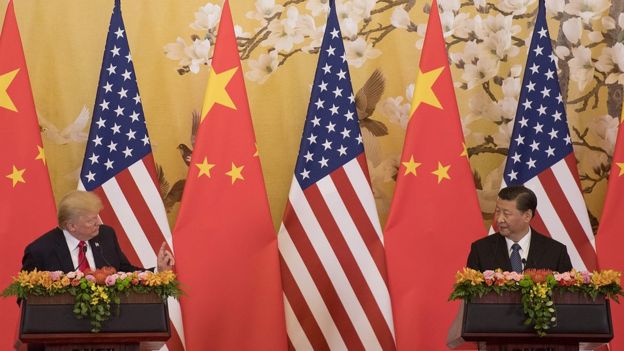
The US is imposing new tariffs on $200bn (£150bn) worth of Chinese goods as it escalates its trade war with Beijing.
These will apply to almost 6,000 items, marking the biggest round of US tariffs so far.
Handbags, rice and textiles will be included, but some items expected to be targeted such as smart watches and high chairs have been excluded.
China has previously vowed to retaliate against any further US tariffs.
The taxes will take effect from 24 September, starting at 10% and increasing to 25% from the start of next year unless the two countries agree a deal.
President Donald Trump said the latest round of tariffs was in response to China’s “unfair trade practices, including subsidies and rules that require foreign companies in some sectors to bring on local partners.
“We have been very clear about the type of changes that need to be made, and we have given China every opportunity to treat us more fairly.
“But, so far, China has been unwilling to change its practices,” he said.
He also warned that if China retaliated then the US would “immediately pursue phase three” which would mean imposing further tariffs with taxes on another $267bn worth of Chinese products.
If he does go ahead with a further $267bn worth of tariffs, it would mean virtually all of China’s US exports would be subject to new duties.
Chinese stock markets opened lower on Tuesday.
Yes, it has. In fact, this latest round marks the third set of tariffs put into motion so far this year.
In July, the White House increased charges on $34bn worth of Chinese products. Then last month, the escalating trade war moved up a gear when the US brought in a 25% tax on a second wave of goods worth $16bn.
This latest round means that around half of all Chinese imports to the US are now subject to the new duties.
It is also the biggest set of tariffs to date, and unlike the earlier rounds this latest list targets consumer goods, such as luggage and furniture.
That means regular households may start to feel the impact from higher prices.
US companies have already said they are worried about the effect of higher costs on their businesses and warned of the risk of job cuts.
Source: BBC



